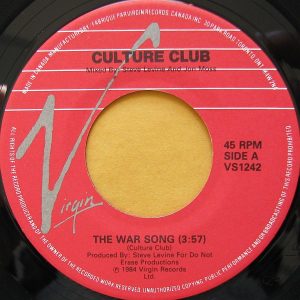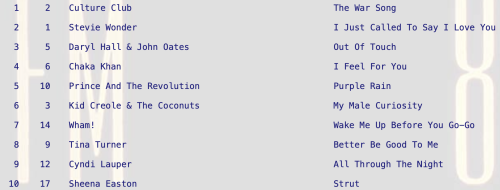#86: The War Song by the Culture Club
City: Montreal, PQ
Radio Station: CKOI
Peak Month: November 1984
Peak Position in Montreal ~ #1
Peak position in Vancouver ~ #15
Peak Position on Billboard Hot 100 ~ #17
Peak Position on Ireland Singles chart ~ #1
Peak Position on Australian Singles chart ~ #2
Peak Position on UK Singles chart ~ #2
Peak Position on Belgian Singles chart ~ #4
Peak Position on Spain Singles chart ~ #4
YouTube: “The War Song”
Lyrics: “The War Song”
The Culture Club are an English new wave band formed in 1981. Led by singer and frontman Boy George, whose androgynous style of dressing caught the attention of the public and the media in the early 1980s, the band have sold more than 50 million records. Its original lineup consisted of Boy George, Mikey Craig, Roy Hay, Jon Moss, and added Phil Pickett and Helen Terry in 1982. George Alan O’Dowd was born in 1961 in Greater London. His father, Jerry O’Dowd, was physically and and mentally abusive and beat his wife when she was pregnant with George. In 1980, he was a member of the new wave band Bow Wow Wow. He left the band within a year and formed a new band initially named the Sex Gang Children.
George O’Dowd was joined by bassist Mikey Craig (born in London in 1960); Jon Moss (born in London in 1957), learned to play drums and became a drummer variously with The Damned, The Edge, Adam and the Ants, and Jane Aire & the Belvederes; And Roy Hay, born in 1961 in Southend-on-Sea, Hay was a hairdresser before he joined the Culture Club.
In 1982, Phil Pickett became a staple additional musician adjacent to the Culture Club. He was born in 1946 in Münster, West Germany. He was an apprentice as a baker, but moved on to develop his talents as a musician. He was part of an obscure pop duo called Kajanus-Pickett and collaborated with Scott English. In 1973 he formed a glam rock band named Sailor. They had a #4 hit in the Netherlands in 1974 titled “Traffic Jam”. Later that year “Sailor” reached #2 in the Netherlands. In 1975, they had an international Top Ten hit titled “A Glass of Champagne”. This was followed by another international Top Ten hit in 1976 titled “Girls, Girls, Girls”. Phil Pickett’s background in Sailor added to the Culture Club’s savvy in stage presence. As well, Helen Terry (born in England in 1956) was a backing singer in the recording studio.
In 1982, the Culture Club reached number-one in eleven nations (and #2 in four others) with “Do You Really Want to Hurt Me”. The song was nominated for a Grammy Award in 1984. That year the Culture Club won a Grammy Award for Best New Artist. In the winter of 1982-83 “Time (Clock of the Heart)” was a Top Ten international followup hit. The band had a third international Top Ten hit with “The Church of the Poisoned Mind in late 1983. “I’ll Tumble 4 Ya” reached number-one in Australia. While “Karma Chameleon” was a chart-topper in over a dozen nations in 1983-84. It was awarded two Ivor Novello Awards for Best Pop Song and Best Selling A-Side. More Top Ten hits followed in 1984 with “Victims”, “Miss Me Blind” and “It’s A Miracle”.
The ninth Top Ten hit for the Culture Club was “The War Song”.

“The War Song” was the debut single from the Culture Club’s third studio album titled Waking Up with the House on Fire. It was composed by the bandmates. “The War Song” is an anti-war song aimed at challenging the view in society that war is glamorous. The Culture Club counters:
War, war is stupid, and people are stupid,
and love means nothing in some strange quarters.
The lyrics compare our ‘post-modern’ sensibilities to being “like a Philistine.” The Philistines were originally Greek from the Aegean Sea coast and coastal islands in eastern ancient Greece. They migrated to what are now present-day sites in Israel: Ascalon, Ashdod, Ekron, Gath and Jaffa, as well as Gaza. In the Bible, the Philistines are depicted in constant battle variously with the Egyptians, the Canaanites, Assyrians, Israelites, and Babylonians. Their pottery has been found as far back as the 12th Century BC. They were metalworkers of gold, bronze and iron, and made advanced weaponry. When the Hebrew people looked across the Jordan River, they saw the Philistines on the other side. And so the two peoples were frequently at war. After being subjugated by the Babylonians, the Philistines were known in the Bible as the “men of Gaza,” until about 450BC when they lost their distinct ethnic identity. In the “The War Song” being like a Philistine denotes being constantly at war. Whether it’s 12th Century BC or 2025, not much has changed.
In addition, the song’s lyrics contend “we’re burning witches too…we’re fighting in our hearts, we’re fighting in the streets.” It seems we constantly need to find scapegoats to help address our free-floating anxieties. As we fight in our hearts, we are full of emotional turmoil. Our fighting in the streets reflects the public square where arguments and physical violence erupt. That “people are stupid,” advances the view that we seem to learn nothing. The age-old playbook unfolds with each new war on the horizon as populations are sold on the latest enemy that we must do battle with.
In 1935, decorated American WWI General Medley Butler published a pamphlet titled “War Is A Racket.” In it he observed a rise in militarism in Europe. He wrote, “In the World War [I] a mere handful garnered the profits of the conflict. At least 21,000 new millionaires and billionaires were made in the United States during the World War. . . . How many of these war millionaires shouldered a rifle? . . . The general public shoulders the bill. And what is this bill? . . . Newly placed gravestones. Mangled bodies. Shattered minds. . . . For a great many years, as a soldier, I had a suspicion that war was a racket; not until I retired to civil life did I fully realize it. Now that I see the international war clouds gathering, as they are today, I must face it and speak out.” Smedley Butler never lived to hear the Culture Club. But, he might agree with them that “war is stupid,” and we have other options like diplomacy to settle international differences.
“The War Song” peaked at #1 in Montreal, #3 in Miami, and Toronto, #6 in Detroit, Columbia (SC), Edmonton (AB), and Buffalo, #7 in Ottawa, #8 in Garden City (NY), Burnaby (BC), and San Francisco, #9 in Cleveland, Sherbrooke (PQ), and San Diego, #10 in Winchester (KY), Norfolk (VA), Calgary, and Denver.
Internationally, “The War Song” climbed to number-one in Ireland, a nation emerging from “the troubles” of many decades of Roman Catholic and Protestant civil strife. The single peaked at #2 in Australia and the UK, #3 in El Salvador (which was endured a civil war from 1979 to 1992), #4 in Belgium and Spain, #5 in the Netherlands, New Zealand, and Norway, #6 in Sweden and #7 in the France and Canada.
The Culture Club disbanded in 1986 after releasing the single “Move Away” and their fourth studio album From Luxury to Heartache. By the mid-80s Boy George was addicted to drugs which impeded his stage performances and drive to sustain the effort required to have a productive music career. In 1986 he was arrested for heroin possession. He rebounded in 1987 to release a debut solo album titled Sold. The single “Everything I Own” topped the pop charts in Ireland, Norway, the UK and Zimbabwe. It was a Top Ten hit in eight more countries. In 1991, “Bow Down Mister” became a Top Ten hit in Austria and Germany.
In 1994, Boy George sang the theme song for The Crying Game. His recording of “The Crying Game” earned him a Grammy Award nomination in the category for Best Male Pop Vocal Performance. In his 1995 autobiography, Take it Like A Man, Boy George came out as gay (not bisexual as he had previously maintained). He also revealed that he had a relationship with bandmate Jon Moss, and that numbers of the songs he wrote for the Culture Club were about his relationship with Moss.
In 1987, Roy Hay formed a band named This Way Up. Hay moved to Los Angeles, U.S. in 1989 and from there wrote and produced for young artists and bands for Sony Music. He branched into commercial composing and sound design with his own company Haywired Music. Hay found later success as a composer in Hollywood. He worked with Hans Zimmer and Robert Altman. As well, he wrote music for the crime drama TV show Cracker, and for Stephen King’s The Dead Zone.
After Culture Club broke up in 1986, Moss released a single entitled “Jump to It” with the group Heartbeat UK. In 1989, under the name Rubberman, Moss released an acid house instrumental track. Boy George used that backing track to create his own song “After the Love”. Moss was later with the band Promised Land, and then Yeah. In the early 2000s he was a member of several punk bands.
In 1998, the Culture Club reformed to release their fifth studio album Don’t Mind If I Do. The debut single “I Just Wanna Be Loved” peaked at #4 in the UK, and
In 2006, Boy George was charged with possession of cocaine, but his charges were later dropped. However, Boy George pleaded guilty to falsely reporting a burglary. In 2008, Boy George was convicted of assault and false imprisonment of Audun Carlsen, a Norwegian model and male escort, who initially stood for a photography session with Boy George. Carlsen claimed that he had been handcuffed to a wall fixture and beaten with a metal chain during their next meeting, although Boy George has always maintained that only the handcuffing was true and that he never beat Carlsen. Boy George was sentenced to fifteen months in jail. By 2013, Boy George was telling the press, “Buddhism has kept me sober.” That year he released his tenth studio album This is What I Do. He has released twelve studio albums to date.
In 2018, the Culture Club released Life, their sixth studio album. It was credited to Boy George and the Culture Club. None of the five single releases from the album charted. The original four – Boy George, Jon Moss, Mikey Craig and Roy Hay – were in the studio. However, Jon Moss was not invited to tour with the album. He got into a legal dispute with the other bandmates and officially left the Culture Club in 2021 (though unofficially starting in 2018).
June 18, 2025
Ray McGinnis
References:
Boy George and Spencer Bright, Take It Like A Man, Harpercollins, 1995.
“Boy George Jailed for 15 Months,” BBC, January 16, 2009.
Lucy Hobson, “Boy George: ‘Buddhism has kept me sober’,” Starpulse.com, September 8, 2013.
“Boy George’s Ex, Jon Moss, Leaves Culture Club,” MSN, October 30, 2018.
“Roy Hay of Culture Club: We’re trying to rebuild the Legacy,” Yorkshire Evening Post, August 16, 2018.
Megan Sauter, “Who Were the Philistines, and Where Did They Come From?,” Biblical Archeology Society, February 13, 2025.
General Smedley Butler, “War Is A Racket,” heritage-history.com, 1935.

CKOI 96.9-FM Montreal Top Ten | November 23, 1984

Leave a Reply